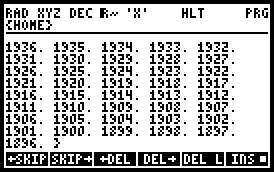The Challenge
Output a list of years that starts with the current year and ends 120 years ago. The birth year of every living human would be included in this list.
Details
The list should be in descending order.
Every built-in function to manipulate arrays and/or lists is allowed.
Shortest code in bytes wins.
When run this year 2016, the output would be
2016, 2015, ..., 1897, 1896
When run next year 2017, the output would be
2017, 2016, ..., 1898, 1897
Etc.
Update
- Some have asked about the format of the list. As most have guessed, it doesn't matter. Insert any separator between the numbers. Intuitively most inserted a comma or space or both, newline or output an array.
- Quasi superhumans like Jeanne Calment are an exception to the rule stated in my question.



y- 120 toy" or "print all the birth years of living people"? Because if someone born in 1896 is alive today, that doesn't mean that there are also still people from 1898 around. \$\endgroup\$